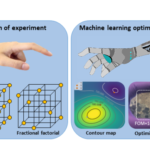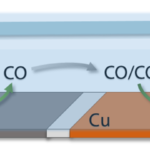Dr. Hangjuan Ren, working with other members of the eCO2EP project team in the CREATE labs in Singapore, has used proton transfer-reaction time-of-flight mass spectrometry (PTR-TOF-MS) for the real-time detection of the intermediates and products of electrochemical CO2 reduction. Using precise measurements of on onset potentials and the degree of 13C isotope discrimination, she was […]
Updates
Pod cast featuring Joel Ager
Aliyah Kovner interviewed Joel and LBNL Staff Scientist Jan Kern for a podcast: Green Machines: The natural and artificial photosynthesis powering the planet
Failure mechanism for CO2 electrolyzers discovered
Dr. Mikhail Koralev, working with other members of the eCO2EP project team in the CREATE labs in Singapore, has discovered that flooding of gas diffusion electrodes (GDEs) used in electrochemical conversion of CO2 to ethylene is caused by polymerization of minor products. The polymer so created reduces the hydrophobicity of the GDE, leading initially to […]
Calton’s paper on tandem photoelectrochemistry published
Calton’s paper on the use of three-terminal solar cells to perform tandem CO2 reduction has been published in Sustainable Energy & Fuels.
Congratulations to Rajiv: 2021 Berkeley Lab Research SLAM Finalist
Post-doc Rajiv Prabhakar finished 3rd in the 2021 Berkeley Lab Research SLAM competition. Rajiv and the other two finalists will be going to the next round to compete against Sandia, Livermore, and SLAC. Here is a link to his finalist interview video.
Ager group presentations at Spring/Fall 2020 Meeting of the Materials Research Society
Virtual presentations: F.EL04.16.04 Surface and Strain Control of 2D MaterialsFrom Fundamental Properties to Nanomanufacturing (presented by Joel Ager) S.EN06.01.07 Design Principles for Photocathodes for Solar Driven Carbon Dioxide Reduction (presented by Joel Ager) S.EN09.04.05 Cascade CO2 Electroreduction to Selective C-C Coupled Products in a Flow Cell (presented by Junrui Li)
Ager group work highlighted in LBNL’s “top ten” solar fuels breakthroughs
Work by former group members Yanwei Lum (#2) and Gurudayal (#5) was featured in LBNL’s News Center article on the top ten solar fuels breakthroughs from the lab over the last 10 year. Source: How JCAP Is Making Solar Fuels Shine, March 3, 2020
Lingfei’s machine learning paper selected for Virtual Issue of Chemistry of Materials.
Lingfei’s paper on design of experiment and machine learning for the optimization of p-type transparent conductors has been selected for inclusion in a Virtual Issue on Machine-Learning Discoveries in Materials Science. The Virtual Issue was curated by Anton O. Oliynyk and Jullian M. Buriak (Editor in Chief of Chemistry of Materials) and has 22 papers […]
Machine learning optimization work published in Chemistry of Materials
Lingfei’s paper on combining strategic design of experiments with machine learning to optimize the synthesis of p-type transparent conductors has been published in Chemistry of Materials.
Cascade catalysis work published in ACS Applied Energy Materials
Guru and David’s paper on implementing a two-step sequential cascade for the electrochemical reduction of carbon dioxide has been accepted in ACS Applied Energy Materials.

